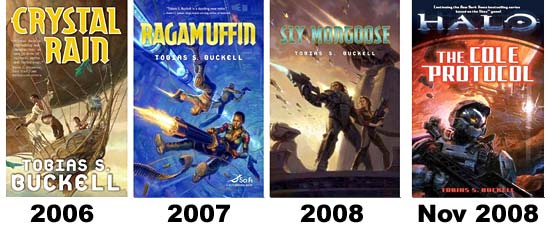

A quick look at the work of Tobias Buckell
[This piece was written in October 2008, in advance of the release Buckell's Halo novel 'The Cole Protocol'. I bought his books because I was curious about the type of science fiction he wrote, and wondered how this would translate to the Halo universe. -lwu]
I've recently finished the last of Tobias Buckell's three novels, in preparation for the release of his Halo novel coming out next month, 'The Cole Protocol'. I have to say, I'm pretty encouraged at this stage.
'Crystal Rain', 'Ragamuffin', and 'Sly Mongoose' all describe a universe in which humans have expanded out from their home planet, only to find that space isn't such a friendly place. Humans have settled on 48 worlds - but for the most part, they're not in control of their lives. The Benevolent Satrapy is a dictatorship, of sorts - Satraps are huge, technologically advanced aliens with mind-control abilities. Humans are controlled via 'the lamina' - the overlay of data that most of us tap into for information about the environment around us. Travel occurs between worlds via wormholes, in ships powered by antimatter (itself created in usable quantities using alien technologies).
The Ragamuffins are a group of resistance fighters, descended from emigrants from Earth's Caribbean region, that refuse to bow down to the Satrapy. They've taken a couple of worlds in the 48, and closed down the wormholes connecting them to the rest of Human society. When 'Crystal Rain' begins, one of these worlds, 'New Anegada', is undergoing an alien-driven civil war - two human factions, one descended from Central American natives, the other descended from Caribbean natives, are fighting for control of the planet. Both groups are technologically back in the steam age - an apocalyptic fight hundreds of years earlier killed all electronics-based technology, and over time most of the remaining tech failed due to age. Long-distance transportation is limited to railroad, or steampunk zeppelins.
The book is a well-written look at what happens when technology crumbles, and is a solid introduction to Buckell's universe. It also introduces us to one of the recurring characters, a Ragamuffin leader trapped on Nanagada (as it's come to be known by the natives), waiting for a way to regain space. This character plays a central role in both Ragamuffin and Sly Mongoose.
Ragamuffin is much closer to traditional science fiction - there are plenty of tech goodies to make the gearheads happy. It's still a very politically/socially aware novel, and centers around the ideas of freedom and self-rule. (These were core building blocks of Crystal Rain, as well, and are extended even further in Sly Mongoose.) Although these novels are set far in our own future, the science part of the science fiction takes a backseat to the social commentary. (In both Crystal Rain and Sly Mongoose, much of the tech is actually behind our current-day standards.)
Buckell spends a lot of time developing his characters, and it pays off; the stories draw you in not because you're waiting for the next cool gun or ship, but because you care what happens to the people. This bodes well for a story set in the Halo universe; Halo novels are pretty circumscribed in terms of tech, so an author needs to flesh out his characters if the reader is going to be engaged. He started by writing what he knew (he grew up in the Caribbean), but his universe expanded over the course of the next two novels, and though he included consistent aspects from earlier novels in Sly Mongoose, they're frosting, not the cake itself. In fact, Sly Mongoose has a story that should resonate with Halo fans; The Swarm (a biologically engineered virus designed to wipe out entire species) will remind you a lot of the Flood.
Taken as a body of work, Buckell's novels are solid, entertaining science fiction, and I'm encouraged at his selection as the next Halo author. The Cole Protocol is due out on November 25 - I'll be one of the first in line to buy it!
